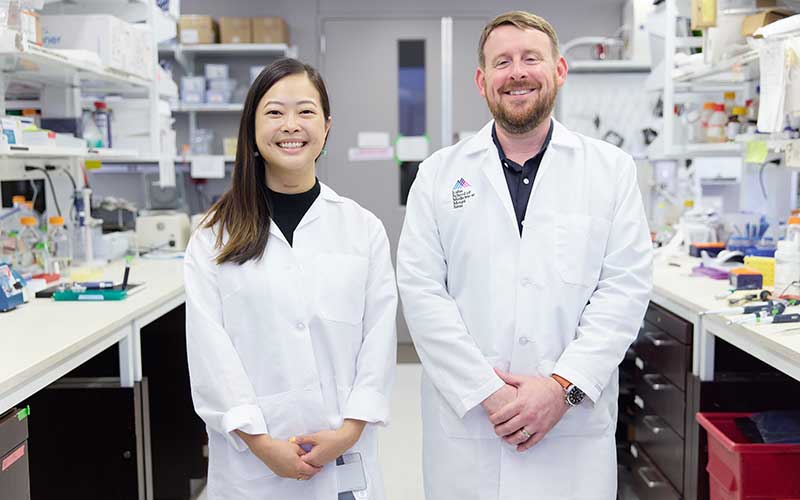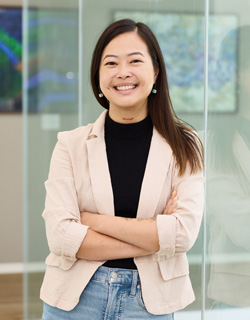PhD Students Get Lab Coats, Marking the Start of New Journeys in Research and Training

Dozens of members of the 2022 PhD and MD/PhD matriculating class of the Icahn School of Medicine at Mount Sinai Graduate School of Biomedical Sciences were presented with lab coats in a celebratory event held Monday, September 19, amid the cheers and applause from the audience—which included faculty, mentors, and the students’ families and friends. Wearing their coats, the students would later take a vow, together, “to uphold the highest levels of integrity, professionalism, scholarship, and honor,” as they embarked on new scientific paths.

Marta Filizola, PhD
“We hold this ceremony to mark the start of our students’ journey in academic research and training,” said Marta Filizola, PhD, the Dean of the Graduate School of Biomedical Sciences and the Sharon & Frederick A. Klingenstein-Nathan G. Kase, MD Professor. “The lab coats we present to them are a symbol of the professionalism and authority that trainees develop and foster during their time in our programs,” added Dr. Filizola, who is also Professor of Pharmacological Sciences, Neuroscience, and Artificial Intelligence and Human Health. Mount Sinai offers PhD degrees in biomedical sciences, neuroscience, and clinical research, and a dual MD/PhD medical scientist training program degree, in addition to nine master’s program degrees.
Eric J. Nestler, MD, PhD, Dean for Academic Affairs at Icahn Mount Sinai, and Chief Scientific Officer for the Mount Sinai Health System told the students: “Getting a PhD is hard work. There is no way around that. It’s hard work because PhDs—unlike all professional degrees, for example, an MD or law degree—require each of us to create a body of knowledge that is new to the world.” Still, he encouraged each not only to “work hard—but play hard,” adding, “Life must go on. No one should defer having a social life during their PhD studies.” Dr. Nestler is also Director of The Friedman Brain Institute and Nash Family Professor of Neuroscience.
A rousing keynote speech was presented by Xiaosi Gu, PhD, Associate Professor of Psychiatry, and Neuroscience, and Founding Director of the Center for Computational Psychiatry. Dr. Gu, a foremost researcher in the area of computational psychiatry, received her PhD degree in Neuroscience at Mount Sinai.
Dr. Gu shared her thoughts on curiosity, which she described as the one “secret Ingredient” capable of helping the students face the PhD journey, while making it enjoyable—and successful.

Xiaosi Gu, PhD
“Curiosity is the fundamental reason why you are still sitting here today instead of already working in a tech company, or Wall Street,” she began. “What should we be curious about? Be curious about science, be curious about people, and be curious about life.
“First, be curious about your work … you must love what you do,” she urged. “Be curious about people. A huge reason I feel pumped every morning going into the office is the people I work with. Face-to-face meetings, small talks in the hallway, grabbing lunch together, these are the daily doses of happiness that keep a day going.
“Finally, be curious about life. This, I believe, is the holy grail of curiosity … We, as scientists, have an obligation to stay curious about the real world and pursue work that can meet human needs … Staying curious about humanity and its issues might be the only way to unlock your intellectual potential and find your path.”
This was followed by a lively presentation of the lab coats, an effort sponsored by the Mount Sinai Alumni Association, and finally, the reading of the PhD Oath. “I will conduct my research and professional endeavors with honesty and objectivity,” they said in unison, while wearing their crisp white lab coats, and reciting a pledge to uphold a set of guiding principles as they launched their science training at Mount Sinai.
What makes this class special? This is who they are:
















 Annette Stauber Cohn, RN, will be 100 years old on Saturday, July 9, 2022. Ms. Cohn enrolled in the former Beth Israel Hospital School of Nursing (now Phillips School of Nursing at Mount Sinai Beth Israel) in 1940. At that time, it was a three-year diploma program.
Annette Stauber Cohn, RN, will be 100 years old on Saturday, July 9, 2022. Ms. Cohn enrolled in the former Beth Israel Hospital School of Nursing (now Phillips School of Nursing at Mount Sinai Beth Israel) in 1940. At that time, it was a three-year diploma program.